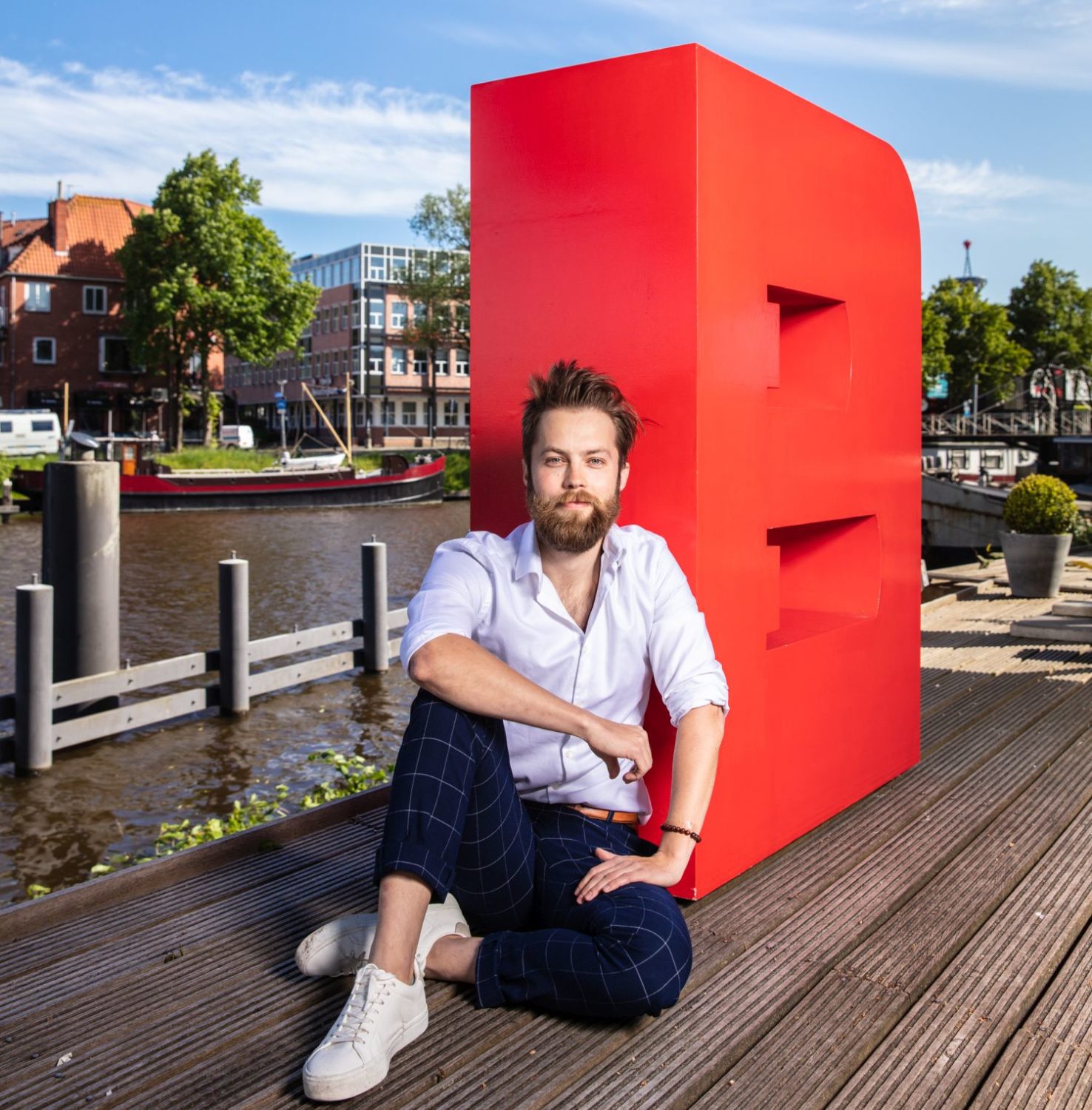Buku is such a logical solution to a problem that it has to be a success. Bertus Jan Epema, who became co-owner and sales director of the streaming platform for textbooks four years ago, still believes so. Things are just moving a little slower and differently than the team had anticipated.
Fact: students in higher education often still buy all their textbooks fairly faithfully in their first year, but in the years that follow, they hit the copying, borrowing, and illegal downloading stage en masse. Fact: higher education teachers would prefer to build a curriculum based on excerpts from multiple books. Fact: textbooks are heavy and made of dead trees.
'If you put it all together, and then you consider our solution, it seems like a simple sum,' says Epema, who lives in Roden. 'That is also the reason why I stepped into this adventure full of conviction, after a long career in banking. It is so obvious that what we offer is better than what is out there. Cheaper, more sustainable, more flexible, more future-proof, richer in possibilities. Fortunately, more and more people are seeing that. I predict that streaming textbooks will be common sense in the Netherlands five years from now.'

Bertus Jan Epema and Alexander Postma
Comparison with Spotify
Right now, it is not. And that, according to Epema, has everything to do with the way the landscape of textbooks is set up in our country. Large publishers have controlled the market since time immemorial. Colleges and universities, often the teachers themselves, choose the method that suits them best and ask their students to purchase the corresponding books. This is a revenue model with which the publishers have grown large and which has worked extremely well in all forms of education so far. So why should they provide space for a streaming platform?
There are plenty of reasons for that, Buku knows. 'We have investigated that, of course. The market for textbooks in higher education is shrinking sharply every year. While the number of students is actually increasing. Students soon discover that they don't use many of their books at all. So they stop buying new books. They simply find other ways to get their text. If publishers offer their books through our platform, then students will start paying for content again, and publishers' earnings will even start rising again.' This will be offset by all the aforementioned benefits for teachers and students.
Bertus Jan Epema would like to get rid of the comparison with music streaming service Spotify. But it does explain nicely. 'In the beginning, artists and record labels were afraid that Spotify would deprive them of revenue. That's long gone. People started copying or illegally downloading anyway, CDs hardly sold anymore, so all the record labels eventually stepped in. And now the music world is earning a living again thanks to Spotify. Where the user can (affordably!) use an enormous wealth of music anytime and anywhere. It is no different at Buku. In fact: in our model, 80 percent of the revenue from subscription fees goes to the publishers, more than labels have left over from Spotify.'

Jeff van der Laan
In the interest of publishers
Those who take out a subscription get access to ALL textbooks. Unlimited. New edition? No problem, it's on there too. For teachers that has a huge advantage. They like to build their lectures with chapters from all sorts of different books. This is now possible. Even better: with our tool they simply put on the platform exactly what they want their students to take in. Chapter from one book, excerpt from another, it's all possible. That means an enrichment of the teaching material.'
No more lugging, always your books on your mobile device at hand. For students, Buku is a godsend. 'Just the search function. Don't have that in paper books, of course. Additional advantage: students are encouraged to read more about the subject they are interested in by the recommendations we make.'
That it works, that students and teachers are happy with Buku, is already evident in practice. The platform ran pilots at the Johan Cruyff Academy of the Hanzehogeschool and at more courses. At the NOVI University of Applied Sciences in Utrecht, which trains ICT professionals, Buku is fully integrated into the students' learning environment. That works superbly. Especially since it is an IT training, we find that very valuable.'

Alexander Postma
Investors
Why isn't every college or university using the Groningen platform yet, you ask. 'It's a matter of time. We will only be relevant if all, or almost all, major publishers join, so that our subscribers never 'miss out.' Talks have been going on for years, and the moment is getting closer and closer when the publishers realize that it is in their own interest to join.'
Buku is not alone in that opinion. Recently, additional partners of stature were found in the Groningen investment companies Carduso Capital and Boost-up. NOM had a major role in the process of finding new investors. Epema: 'Especially Bjorn Redmeijer of Flinc should be mentioned. Really a good coach, who could put us on the rack. He asked good questions, put us on edge and that way we got our own story much clearer. As a result, we ended up being offered more investment money than we needed. We were really in a great position.
I predict that streaming textbooks will be common sense in the Netherlands five years from now
Bertus Jan Epema, Buku
Redmeijer became involved with the startup a year and a half ago. "I already knew Buku from the media, of course. I immediately found it interesting to work with the guys. The team is good, especially the interaction between the young Jeff and the dyed-in-the-wool Bertus Jan is great. I was positively surprised by the product. The technology is there, everything works, the development is already very far along, ready to roll out further. And that's something I was able to help them with.'
What Flinc does is work with innovative entrepreneurs to come up with an investor-ready business plan. Redmeijer: "In my opinion it could have been a little tighter, a little sharper. In several sparring sessions I questioned them critically. Where are the opportunities in the market? How do you translate this into strategy? How do you launch abroad? How do you deal with pricing here? What will the revenue model be? What does this mean for the financial projections and funding needs? What are you looking for in an investor, besides capital? Questions like that. That helped, I think, on the way to finding the right investors. They have those now, parties that not only provide money, but also advice, experience and their network.'

Bertus Jan Epema
From Africa to Asia
With the money, Buku is working to expand the team of programmers in the Netherlands to improve the technology and make the platform even more scalable, as well as to strengthen teams abroad. Because there already are. 'There we show how powerful our platform is. Moreover, the big Dutch publishers there do participate, and so they see what the possibilities are. In Suriname, for example, we are already very big.'
There, textbooks are still relatively much more expensive than here. So hardly anyone buys them. But a subscription to our services is affordable. So the students get the best teaching materials and the publishers also earn something. That is the beauty of our model: we adjust the subscription fee to the income level of the country. In the Netherlands it's 25 euros a month, in Suriname a tenner. And in Africa it will be even cheaper. I think that with a maximum of 25 people in Groningen together with resellers in different countries we can serve the whole world.
It is by no means illogical for Buku to look first to countries where the level of prosperity is somewhat lower, Epema explains. These are areas where publishers hardly earn anything because books are unaffordable. And then they tend to cooperate with us. Then you're talking about the biggest textbook publishers in the world. We are talking to all of them. In Namibia we now have a sales team, in Sierra Leone we are talking to the minister, in other African countries we are running projects.'
It's typically the path a startup can take. You think you're going to focus on the Netherlands to begin with, but the train goes the other way first. That it's a round trip leads no doubt for Buku. 'In the Antilles we are also going very fast. As in Suriname, the books are from Dutch publishers. They earn money thanks to our platform where before they hardly had any turnover. For us they are great showcases that can really only result in success on the Dutch market.'

Bjorn Redmeijer
The brilliant idea of Jeff van der Laan
He thought of it back in his college days and cut the knot in 2015: Jeff van der Laan went full throttle for a streaming service for textbooks. A year later, things looked so promising that he professionalized further and recruited Bertus Jan Epema. The roles have recently been divided: Van der Laan is now CFO of the company, Alexander Postma CTO and Epema CEO. Together with their development team, they have already won several awards at startup festivals, including the national Innovation Award Audience Award of the Chamber of Commerce 2019, where they had to compete with 99 other companies.
